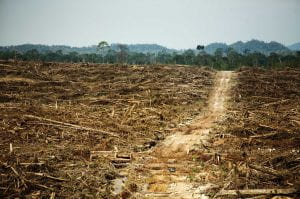By Oryza Astari, M.A. International Affairs ‘20
Rainforest Action Network’s “Indonesia, Climate Change, and Rainforests” report describes destruction of Indonesia’s rainforests as one of the leading causes of climate change. Furthermore, Greenpeace describes Indonesia as one of the “top tier emitters of global greenhouse gas emissions” due to deforestation.
This environmental narrative—accepted widely by the international community and particularly by the European Union (EU)—conflicts with Indonesia’s own version of the story.
On March 25, the Tanah Merah project in Indonesia’s easternmost province of Papua officially began, as it cleared out rainforests to make way for palm oil. Mongabay and the Gecko Project, two media companies that focus on conservation, report that the project is estimated to generate US$6 billion in timber and create a large palm oil plantation “almost twice the size of London.” Clearing Papuan rainforests will emit immeasurable amounts of carbon dioxide into the atmosphere, exacerbating the climate crisis.

The EU, an international leader in international environmental efforts, introduced its latest Renewable Energy Directive, dubbed RED II, in response to the deforestation in Indonesia. RED II introduces a new approach to biofuels based on the concept of indirect land use change (ILUC). ILUC is the transformation of carbon-rich forests, wetlands, and peatlands, into land(s) used to produce crops for biofuels, resulting in the vast release of carbon dioxide into the atmosphere. The EU argues that ILUC risks “negating” the savings that result from the use of biofuels; thus, the use of such “high risk” crops as palm oil will be phased out by 2030.
Below, I will present the Indonesian perspective on the issue, followed by the EU response to the Indonesian narrative. Finally, I will conclude by presenting the winner of the narrative battle.
The Indonesian government’s strategy in its narrative battle against the EU involves evoking emotional content and controlling the process of the project.
First, Indonesian officials invoke inflammatory words when describing RED II. Such words evoke a particular narrative that engages audiences on an emotional level, bringing out emotions such as anger or even disappointment, particularly for the Indonesian audience. For instance, Former Trade Minister Enggartiasto Lukita called the move protectionist, arguing that the policy is aimed to support European biofuels producers of rapeseed and sunflower oils.
Vice Minister of Foreign Affairs Mahendra Siregar concurred, calling it a “‘structured and systematic’ campaign to block palm oil” from competing with European-grown biofuels. Vice Minister Siregar furthered his argument by concluding that the environmental concern of RED II was simply a façade, a “guise,” for protectionism.
Indonesian President Joko “Jokowi” Widodo took it a step further, calling the policy an “act of trade war.” Not only is President Jokowi evoking emotional content, he is also controlling the process of projection.
President Jokowi took the lead by repeatedly calling the EU policy a “palm oil ban.” His position, as the highest government official and the leader of the country, lends legitimacy and credibility to his message. As such, his cabinets followed his lead, and began invoking similar inflammatory words such as “discrimination” and “protectionism,” as illustrated above.
Furthermore, President Jokowi’s invocation of “trade war” puts the focus on EU-Indonesian trade on palm oil, rather than the environmental issue. In 2018, the European bloc reportedly consumed more than 7 million tons in palm oil biofuels, with 65 percent used as energy. It is evident that palm oil biofuels trade is lucrative both for the European bloc and Indonesia, pointing to the EU’s hypocrisy on the palm oil issue. Thus, the obvious response—and remedy—for Indonesia, after months of failed negotiations with EU officials, was to bring a lawsuit to the World Trade Organization in December 2019.
In response, the EU focuses their narrative argument on the epistemological and informational content. RED II was accompanied by a report with available, consistent, scientific data from 2008 to 2015. The European Commission reiterates that it arrived at the decision based on the given scientific data, which shows that palm oil has been associated with high risk of deforestation.
Furthermore, the EU invokes the identity narrative of an “Energy Union”—a bloc with a strong commitment to sustainability—in its response to Indonesia. This invocation strengthens the EU’s position, as it illustrates to the audience that the policy is harmonious with the EU’s values and identity as a champion of energy and the climate targets.
While the WTO suit will take years to be decided, in the battle of messaging between Indonesia and the EU, the winner is clear. The EU’s new policy is harmonious with its identity; its claims backed by nine years’ worth of scientific evidence. The relationship between the EU identity and scientific, enlightenment thinking makes for a cohesive, persuasive message that is consistent with the EU’s narrative.
On the other hand, Indonesia’s counter-messaging campaign on the “palm oil ban,” although strong for the local audience, has been unsuccessful. Indonesia’s lack of response on deforestation claims is dissonant with the wider environmental messaging, which have been accepted by the scientific community and international audience. More importantly, Indonesia’s latest Papua shows that its loss was not simply due to the EU’s more persuasive message, but because its narrative simply does not match its reality.
The opinions expressed in this blog are those of the author. They do not express the views of the Institute for Public Diplomacy and Global Communication or the George Washington University.

